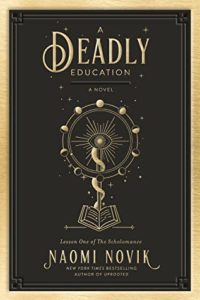
I’m a sucker for academy settings, and I’d been hearing great things about Naomi Novik for a long time, so when A Deadly Education debuted this fall, putting my name on the library wait list was an easy decision, and ultimately a rewarding one.
A Deadly Education is very clearly a post-Harry Potter magic school novel, from the British setting to the moving staircases to the school trying to kill you. But it’s not just rehash of popular tropes—Novik writes for an older audience in a way that really leans into the dark side of school. In Harry Potter, having deadly threats around every turn and no teachers around to help was a plot hole to get the story going. In A Deadly Education, it’s the entire plot.
Our heroine, El (short for Galadriel), is a magic user in a world where magic-users are particularly tasty snacks for terrifying beasts of various sorts. So she’s thrown into a heavily warded magic school with a bunch of other kids her age, allegedly because it’s the safest place for her. It’s not especially safe. And, bring raised by a hippie single mother in a yurt in the Welsh countryside, she doesn’t have the connections of the kids coming from the privileged magical enclaves and is forced to mostly go it alone, regardless of the dangers.
The story is told in first-person from El’s perspective, with a stream-of-consciousness that mixes background on her world, her battles with monsters, and her social troubles, stemming from the haughty cliquishness of other students and her own prickliness. Then there’s the prophecy that El is destined to become a powerful dark sorceress, which she’s trying to resist, and her repeated encounters with Orion, the enclave kid who insists on saving everybody else’s lives, whether they needed saving or not.
The result is a gripping story that’s hard to put down, even if I’m not sure how much of it would stand up to closer scrutiny. El’s world-weary and sarcastic voice makes it easy to immerse in the narrative, even when she’s just infodumping (between this, Murderbot, and Chasing Graves, I’m beginning to think that first-person narration from cynical, sarcastic protagonists is just my thing). And the monster attacks sprinkled throughout give the narrative a good mix of world-building, character exploration, and action. El’s internal struggle against her darker impulses, social struggles in and unjust and unfriendly world, and physical fights for survival all alternate taking center stage, and they’re all fascinating storylines.
But, while Novik gives enough justification for the premise to allow for the suspension of disbelief, I didn’t totally buy the parents sending their kids en masse to a school with a fatality rate above 50%. And the widespread ethnic diversity didn’t seem to go any farther than names, languages spoken, and the Scandinavian kids loving salty licorice (though, I mean, fair enough)—plus one insensitive passage for which Novik has apologized and pledged to remove in the next printing. Finally, the book leans on the “this major character is just special” trope even harder than Harry Potter, which is saying something.
And I can talk myself into a lot of it. The genre demands danger and absent parents, and a semi-plausible justification is better than none. We don’t get an in-depth view of many characters except for El, who despite being half-Indian was raised entirely apart from her father’s side of the family, so some shallowness is to be expected (although her sometimes-ally Aadhya gets enough screen time that this explanation doesn’t totally work). And the sequel hook at the end intimates that we’ll learn more about what’s going on with the two unusually powerful characters.
On the whole, it’s a really engaging and promising start to the series, with a generally self-contained storyline and a satisfying ending, albeit with a sequel hook that may make you upset about the six-month wait for book two. I’m not sure everything works perfectly, but I enjoyed the read and definitely want to check out the sequel.
Recommended if you like: magic schools, prickly, sarcastic protagonists.
Overall rating: 15 of Tar Vol’s 20. Four stars on Goodreads.
